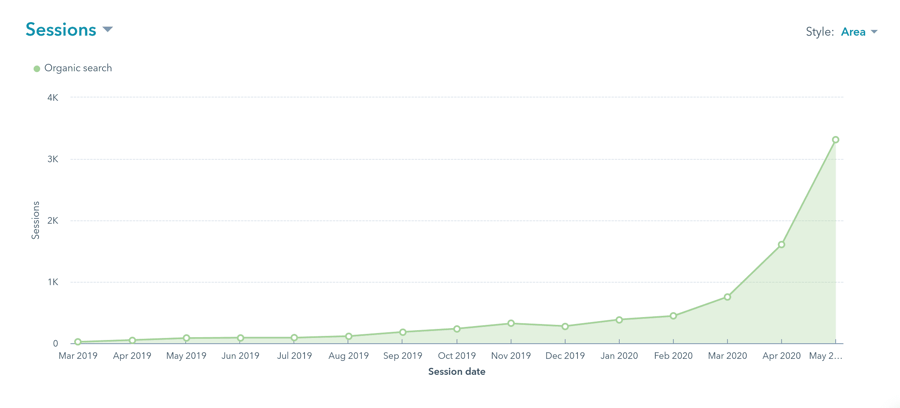Elevate your content with HubSpot Marketing Hub for content marketing. Discover how our strategies and HubSpot's tools drive success.
Guide to
Better Blogging
Are you looking to attract a stream of engaged visitors?
The Ultimate Guide to Running an Effective Blog that's driving results.

Introduction
A Blogging Definition
Blogging is the practice of creating and publishing written and visual content through self-publishing platforms on the internet. Initially, blogging began as a medium for individuals to document personal experiences in a diary-style format, but it has since evolved into a tool utilized by numerous businesses, integrated into their websites as a means of enhancing their online presence.
Blogging is a fantastic way to share your thoughts and ideas. Over the years, the blogosphere has exploded, with millions of personal bloggers and business marketers publishing regular blog content online. Whether you're a freelancer, a business owner, or just someone with a story, online blog articles can help you attract visitors, engage with others, and establish your online presence.
More than 600 million blogs are out of 1.9 billion websites worldwide (Web Tribunal). 77% of internet users read blogs (Social Media Today), and nearly 26% of people in the U.K. aged 5–18 are reading blogs (Statista).
You'll need to choose a platform to host your blog to get started. Popular options include WordPress, Blogger, Medium, or HubSpot. Once you've chosen a platform, you can start creating content. Blogs can take many forms, including personal, business, news, and hobby blogs. Regardless of the type of blog you choose, blogging has many benefits.
Creating content relevant to your audience can attract new leads and establish yourself as an expert. For individuals, blogging can be a way to express themselves creatively and connect with others who share their interests.
Remembering a few best practices is essential to maximize your blogging efforts. Creating high-quality content optimized for search engines is key to attracting traffic to your blog. Promoting your blog on social media can also help you reach a wider audience. And engaging with your audience through comments and social media can help you build a loyal following.
In summary, blogging is a powerful tool for individuals and businesses alike.
Creating successful content that resonates with your audience allows you to establish your online presence and connect with others who share your interests. With the right strategy, your blog can help you achieve your goals and build a successful online presence.
Blogs are essential to a successful content cluster approach, building authority for a topic and building trust in your visitors.
Why Does Blogging Matter?
-
Blog posts that are at least 1,500 words long get 3.5 times more shares than posts that are 500 words or less. Longer content is more likely to be shared and engaged. If you want your content to be shared and engaged with, you must make it long enough to provide value to your readers.
-
Content that is published consistently gets 40% more traffic than content published sporadically. It is important to be consistent with your content publishing. You need to publish content regularly to get more traffic to your website.
-
Content that is optimized for search engines gets 100% more traffic than content that is not optimized. Optimizing your content for search engines is important to get more traffic. If you want your content to be found by people searching for information online, you need to optimize it for search engines.
-
Visually appealing content gets 94% more views than content that is not visually appealing. Making your content visually appealing is important to get more views. If you want your content to be noticed and read, you must make it attractive.
-
Blogging can increase website traffic by up to 120%. Blogging is a very effective way to drive traffic to your website. To get more traffic to your website, start blogging.
The term "weblog" was coined by Jorn Barger on December 17, 1997. The short form, "blog", was coined by Peter Merholz, who jokingly broke the word weblog into the phrase we blog in the sidebar of his blog Peterme.com in May 1999. (Wikipedia)
Types of Blogging
Blogging comes in various forms, each with unique characteristics, audiences, and goals. Here are some of the most common types of blogging:
-
Personal Blogs: Personal blogs are written by individuals who want to share their experiences. They can cover a wide range of topics, from travel to politics. Personal blogs can cover everything, from travel and food to parenting and politics. An Aspiration Marketing favorite: Dallas Wine Chick.
-
Business Blogs: Business blogs, on the other hand, are written by businesses and organizations to establish their expertise and attract, engage, and convert visitors to new customers. They can cover topics from industry news to customer case studies and consumer-relevant topics a business tackles. The HubSpot blog is one of the best; see the above video.
-
News Blogs: These blogs deliver up-to-date news, press releases, and information on a particular topic or industry. News blogs can cover various topics, from politics and entertainment to technology and science. The New York Times articles and posts are exceptional.
-
Hobby Blogs: These blogs focus on a particular hobby or interest, such as cooking, gardening, or fitness. Hobby blogs are an excellent way for individuals to share their expertise and connect with others who share their passion. A house favorite: Blogis Librorum of Books Tell You Why. (insider knowledge, it gets more than 70,000 visitors a month)
-
Niche Blogs: These blogs cover a particular topic or industry. Niche blogs can cover various topics, from fashion and beauty to finance and real estate. Can you find yours among 50 Lucrative Blog Niches?
Understanding your audience is key to creating content that resonates with them, is optimized for search engines, is promoted on social media, and engages with your audience through comments and social media.
By selecting the best type of blog for your goals, your audience, and their interests, and following a couple of best practices, you can build a successful online presence that connects you with like-minded individuals and helps you achieve your long-term marketing goals.
Benefits of blogging
You can share your expertise and insights with the world when you blog. Here are some of the benefits of doing it right:
-
Establishing Expertise: Establishing yourself or your business as a thought leader in your industry, attracting new customers, and enhancing your brand is essential. Creating high-quality, informative content can improve your website's search engine rankings, build relationships with your audience, and open growth opportunities.
-
Attracting New Customers: Blogging is a powerful way to attract new customers to your business. By creating content that addresses the questions and concerns of your target audience, you can draw in new visitors, engage them, and convert them into, ultimately, happy customers.
-
Improving Search Engine Rankings: Blogging can also help improve your search engine rankings. Creating high-quality, informative content can improve your website's visibility in search results, increasing traffic and more leads. Blog posts are an essential element of a successful topic cluster strategy.
-
Building Relationships: Blogging is a great way to build relationships with your audience. Engaging with your readers through comments and social media can create a sense of community and establish a loyal following.
-
Enhancing Your Brand: Blogging can also be a powerful tool for enhancing your brand. By sharing your insights and experiences, you can build a reputation as an authority in your industry and open up new opportunities for career advancement.
Regardless of your reason for blogging, it's essential to keep a few best practices in mind to implement your content marketing successfully. These include creating high-quality content optimized for search engines, promoting your blog on social media, and engaging with your audience. We've got you covered for tips on doing blogging all wrong, too. ;-)
Building Relationships Through Blogging
One of the most powerful benefits of blogging is its ability to help you build relationships with your audience. Engaging with your readers through comments and social media can create a sense of community and establish a loyal following.
Why Building Relationships Matters
Building relationships with your audience is important for several reasons:
-
It builds trust and credibility with your readers. By showing that you care about their questions, concerns, and feedback, you can establish yourself as an authority in your industry and build a loyal following.
-
Building relationships can help you better understand your audience's needs and preferences. By engaging with them regularly, you can gain valuable insights to help you create more targeted and effective content.
-
It helps you promote your brand and generate word-of-mouth marketing. When your readers feel connected to your brand, they are more likely to share your content with their networks, which can help you reach new audiences and grow your following.
Using Blogging to Build Relationships
Blogging is a great way to build relationships with your audience. Here are a few tips for connecting with your readers:
-
Encourage Comments: Encourage your readers to leave comments on your blog posts and respond to them promptly and thoughtfully. This can help create a sense of community and show your readers that you value their input.
-
Use Social Media: Use social media to promote your blog content and engage with your followers. Respond to comments and messages in a friendly and helpful manner, and share your readers' content to show appreciation.
-
Host Events: Consider hosting events or webinars that allow you to connect with your readers in real time. This can help you build relationships and establish yourself as an authority in your industry.
Building relationships through blogging is a powerful way to establish trust and credibility with your audience, gain valuable insights, and promote your brand. By encouraging comments, using social media, and hosting events, you can connect with your readers and build a loyal following that will support your brand for years to come.
The Importance of Consistency in Blogging
One of the critical elements of a successful blogging strategy is consistency.
Why Consistency Matters
Consistency is important for several reasons.
-
It establishes a predictable schedule for your readers. If your readers know when to expect new content from you, they are more likely to visit your site regularly and engage with your brand.
-
Consistency can help you build a loyal following. When your readers know they can rely on you for regular, high-quality content, they are more likely to become invested in your brand and share your content with their networks.
-
It is crucial for SEO. Search engines like Google favor sites that produce fresh, high-quality content regularly. By consistently publishing new content, you can improve your site's search engine rankings and attract more organic traffic.
Maintaining Consistency in Blogging
Maintaining consistency in blogging can be a challenge, but there are a few key strategies that can help. Here are some tips for keeping your blogging efforts on track:
-
Develop a Content Calendar: A content calendar helps you plan and organize your content in advance; you stay on track and ensure that you are consistently publishing new content.
-
Create Evergreen Content: Evergreen content remains relevant and valuable over time. By creating evergreen content, you can ensure that your content continues to drive traffic and engagement long after it is published.
-
Set Realistic Goals: Setting realistic goals for your blogging efforts can help you stay motivated and on track. How Often Should You Post New Blog Content? Whether you aim to publish one post per week or five, it's essential to set goals that are achievable and sustainable.
-
Automate Your Posting Schedule: If possible, automate your posting schedule using tools like Hootsuite or Buffer. This can help you stay on track and ensure that your content is consistently published even when you're busy or away from your computer.
Consistency is a crucial element of a successful blogging strategy. By establishing a predictable schedule for your readers, you will build a loyal following and improve your site's SEO.
You Might Also Like This Post:
The Role of Social Media in Blogging
In today's digital age, social media has become an essential tool for bloggers.
Why Social Media Matters for Bloggers
Social media platforms like Facebook, Twitter, and Instagram are powerful tools for bloggers:
-
Social media provide ways to promote your content to a wider audience. By sharing your blog posts on social media, you can attract new readers and drive traffic to your site.
-
You have additional platforms to engage with your audience. By responding to comments and messages on social media, you can build relationships with your readers and create a loyal following.
-
You can explore additional ways and channels to stay up-to-date with industry news and trends. By following influencers and other bloggers on social media, you can stay informed and ensure that your content is relevant and timely.
Using Social Media to Promote Your Blog
To make the most of social media as a blogger, you can use a few key strategies. Here are some tips for promoting your blog on social media:
-
Share Your Content: Share your blog posts on your social media accounts, using catchy headlines and visuals to attract attention.
-
Engage with Your Followers: Respond to comments and messages on social media, and take the time to build relationships with your followers.
-
Use Hashtags: Use relevant hashtags to make it easier for people to find your content on social media.
-
Share Industry News: Share industry news and trends on social media, showing that you are knowledgeable and up-to-date.
-
Collaborate with Other Bloggers: Collaborate with other bloggers on social media to cross-promote your content and reach new audiences.
Social media is an essential tool for bloggers. By following these tips, you can take your blogging to the next level.
Blog Monetization
Blogging can be a profitable venture if done right. Here are different ways to monetize your blog and turn it into a source of income.
-
Advertising: One of the most common ways to monetize a blog is through advertising. You can place ads on your blog and earn money based on the number of clicks or impressions they receive. You can use platforms like Google AdSense or work directly with advertisers to place ads on your blog.
-
Sponsored Posts: Sponsored posts are another way to monetize your blog. You can partner with brands to create content that promotes their products or services. In return, you can receive payment or other compensation.
-
Affiliate Marketing: With affiliate marketing, you can earn a commission by promoting products or services on your blog. You can include affiliate links in your content, and if someone purchases through your link, you earn a commission.
-
E-Commerce: If you have a product or service to sell, you can use your blog as a platform to promote and sell it. This can include physical products, digital products, or services like coaching or consulting.
-
Membership or Subscription: If you have a loyal following, you can create a membership or subscription program that offers exclusive content or perks to members in exchange for a fee.
There are several ways to monetize your blog and turn it into a source of income. By choosing the right monetization strategy and staying committed to creating high-quality content, you can build a successful and profitable blog as a standalone blog or as a blog to generate leads for your business website.
Promote your Blog
Creating great content is just the first step in building a successful blog. If you want to drive traffic to your site and build a following, you need to promote your blog and get it in front of your target audience. Here are five strategies for promoting your blog and driving traffic to your site:
-
Social Media: Social media platforms like Facebook, Twitter, and Instagram can be powerful tools for promoting your blog. By sharing your blog posts on social media, you can reach a wider audience and drive traffic to your site.
-
Email Marketing: Email marketing is another effective way to promote your blog. By building an email list, you can send subscribers regular updates and links to your latest blog posts.
-
Guest Blogging: Guest blogging involves writing content for other blogs in your niche. By doing so, you can reach a new audience and drive traffic back to your blog.
-
Influencer Marketing: If you partner with influencers in your niche, you can tap into their audience and drive traffic to your blog. You can work with influencers to create content or promote your blog on their social media platforms.
If you want to attract and retain customers, you need to create content that they care about. - Joe Pulizzi
Metrics to Measure a Blog's Success
A blog can be a powerful way to share ideas and connect with your audience. But to succeed, tracking and analyzing your blog's success is essential. By measuring key metrics, you can optimize your content strategy and ensure your blog drives results. Here are four metrics to measure your blog's success:
-
Traffic: Tracking your traffic is one of the most important metrics. Using tools like Google Analytics, you can understand how many people are coming to your site and where they're coming from. This data can help you optimize your content strategy and ensure that you're reaching your target audience.
-
Engagement: Engagement measures how people interact with your content. Metrics like comments, shares, and likes can give you a sense of how engaged your audience is with your content. By tracking engagement, you can understand which types of content resonate with your audience and adjust your content strategy accordingly.
-
Conversions: Conversions measure how many people take a desired action on your site, like filling out a form, making a purchase, or subscribing to your email list. By tracking your conversion rates, you can understand how effectively your site converts visitors into customers or subscribers.
-
Revenue: If you're monetizing your blog, revenue is a key metric to measure. By tracking your revenue, you can understand how much your blog generates and how to optimize your revenue streams. This data can help you understand which monetization strategies are working and which need improvement.
Measuring your blog's success is essential to building a successful and profitable blog. By staying committed to analyzing and measuring your blog's success, you can build a loyal following and achieve your blogging goals.
 The above example shows the development of sessions from Organic Search in the first 15 months of a new website launched in February 2019. Until April, it was managed with two weekly blog posts of about 1,400 words. We added a third weekly post and some thorough SEO and Keyword optimization in May 2019. Yet, it took another nine months for results to show.
The above example shows the development of sessions from Organic Search in the first 15 months of a new website launched in February 2019. Until April, it was managed with two weekly blog posts of about 1,400 words. We added a third weekly post and some thorough SEO and Keyword optimization in May 2019. Yet, it took another nine months for results to show.
Content marketing is not just about creating content, it's about creating content that resonates with your target audience and helps achieve your business goals.
- Kristin Tynski
Conclusion
If you're considering starting a blog, now is the time. Blogging is an excellent way to share your thoughts, ideas, and expertise while building your brand or business. With the right approach, blogging can be a powerful tool for driving traffic, establishing credibility, and engaging with your audience. Whether you're a seasoned writer or just starting, there are some essential steps to create a successful blog that resonates with your readers and achieves your goals.
Blogging offers several long-term benefits to make it one of the marketing approaches with the highest Marketing ROI:
-
Establishing authority: Blogging provides a platform for sharing your expertise and establishing yourself as an authority in your industry.
-
Building brand awareness: Consistent blogging can help to build brand awareness and drive traffic to your website.
-
Improving SEO: Blogging can improve your website's rankings by providing fresh, relevant content for search engines to crawl.
-
Generating leads: Blogs can attract and nurture leads by providing useful, relevant content that meets their needs and interests.
-
Developing relationships with customers: Blogging can help to develop a relationship of trust with your customers by providing them with valuable information and insights.
-
Providing customer support: Blogging can also be used to provide customer support by answering frequently asked questions and providing solutions to common problems.
-
Creating opportunities for collaboration: Blogging can open up opportunities for collaboration with other bloggers and businesses in your industry.
-
Improving writing and communication skills: Regular blogging can improve your writing and communication skills, making you a better communicator in all areas of your life.
-
Building a community: A blog can help to build a community of like-minded individuals who share your interests and values.
-
Generating revenue: A successful blog can be monetized through advertising, affiliate marketing, sponsored content, and other strategies, providing a source of passive income for your business.
Frequently Asked Blogging Questions
A blog is a website that features regular content updates in the form of posts or articles. You need a blog to create an online presence, establish yourself as an expert, and drive traffic to your website.
The frequency of your blog posts should be determined by your available resources and goals. Consistency is key, so it's better to publish one high-quality post per week than several low-quality posts. If you can, post twice a week.
Idea generation can be challenging, but you can look for inspiration from your industry, competitors, customers, and experiences. Keyword research and social listening are also helpful tools for generating ideas. Identify gaps of subtopics that are missing in your topic cluster.
SEO-friendly blog posts have a clear structure, relevant keywords, and high-quality content. Use title tags, meta descriptions, and header tags to help search engines understand the structure of your post.
Comments can be a great way to engage with your audience and build a community. However, managing comments can be time-consuming, so you should decide based on your available resources and your goals.
You can promote your blog posts through social media, email marketing, guest posting, and other channels. Make sure to tailor your promotion strategy to your audience and your goals.
Key metrics to measure include traffic, engagement, conversions, and revenue. Use tools like Google Analytics to track your progress and optimize your content strategy.
Monetization strategies include advertising, affiliate marketing, sponsored content, and selling digital or physical products. Choose a monetization strategy that aligns with your brand and your audience.
Staying motivated can be challenging, but setting goals, creating an editorial calendar, and seeking feedback can help keep you on track.
Writer's block is a common challenge for bloggers. Some strategies to overcome it include taking a break, changing your environment, and practicing free writing. Everyone experiences writer's block, and it's important to be kind to yourself and stay committed to your goals.
The latest on Blogging
- December 1, 2025
- Shelley
- November 3, 2025
- Fabi Pina
- September 30, 2025
- Martin










